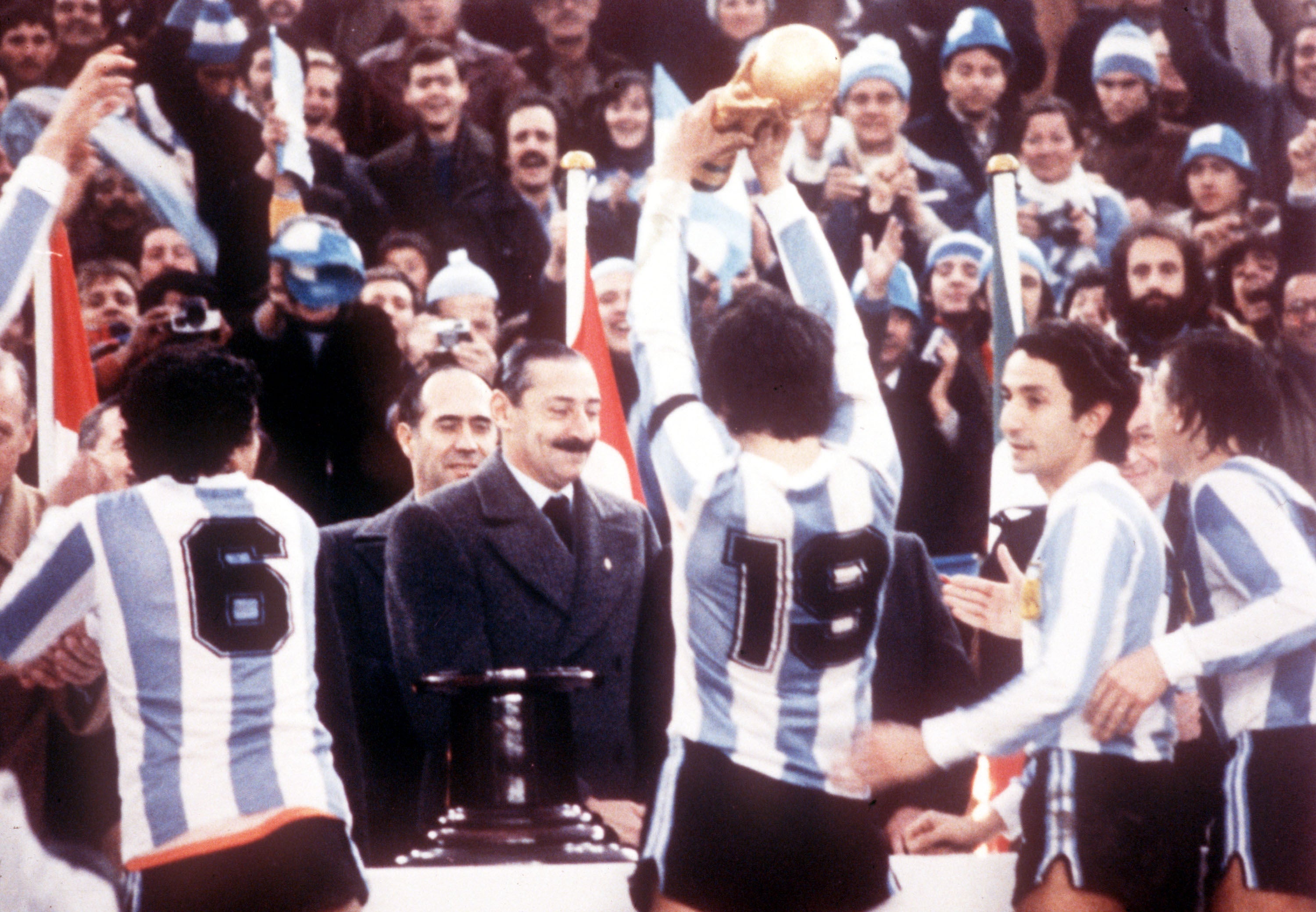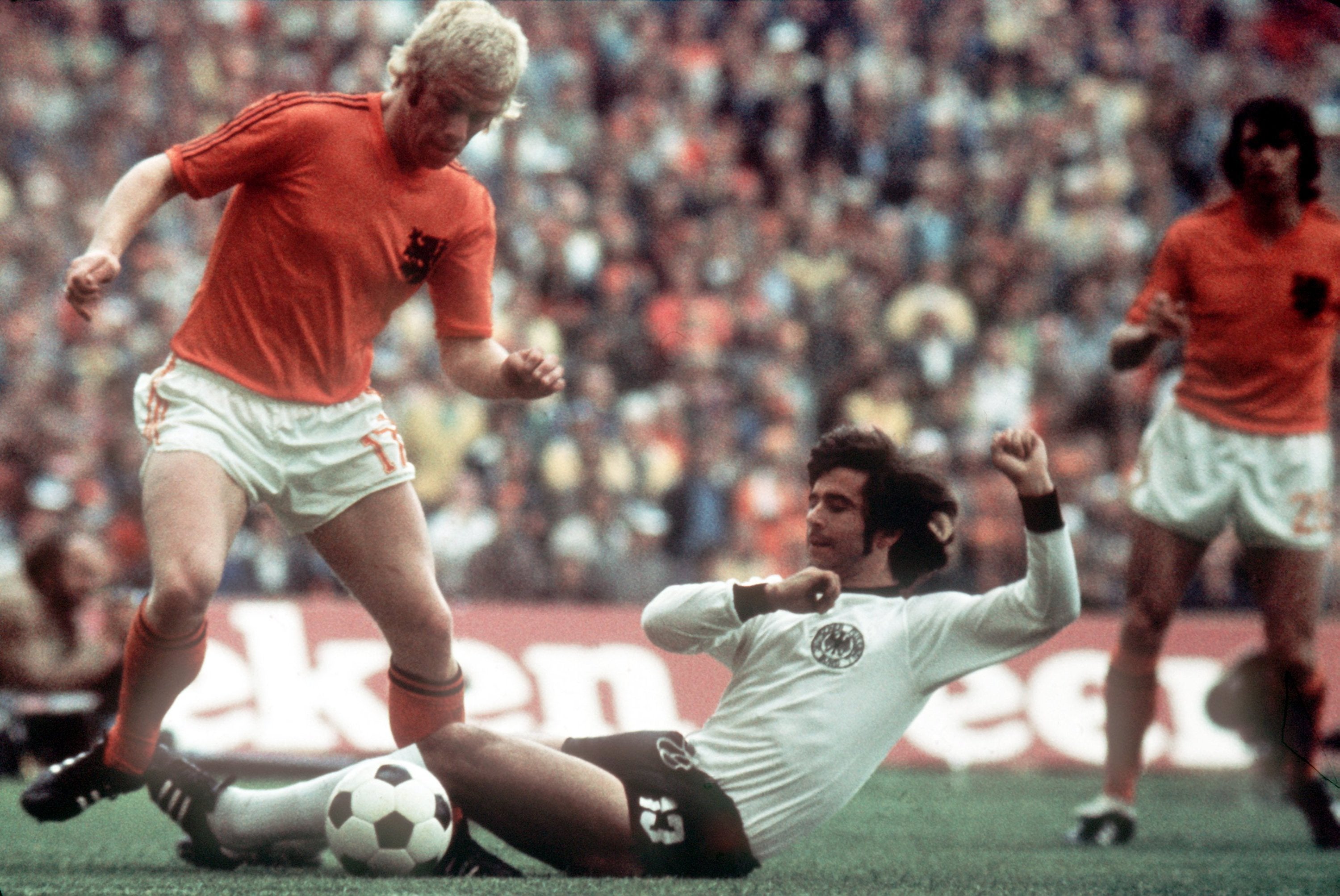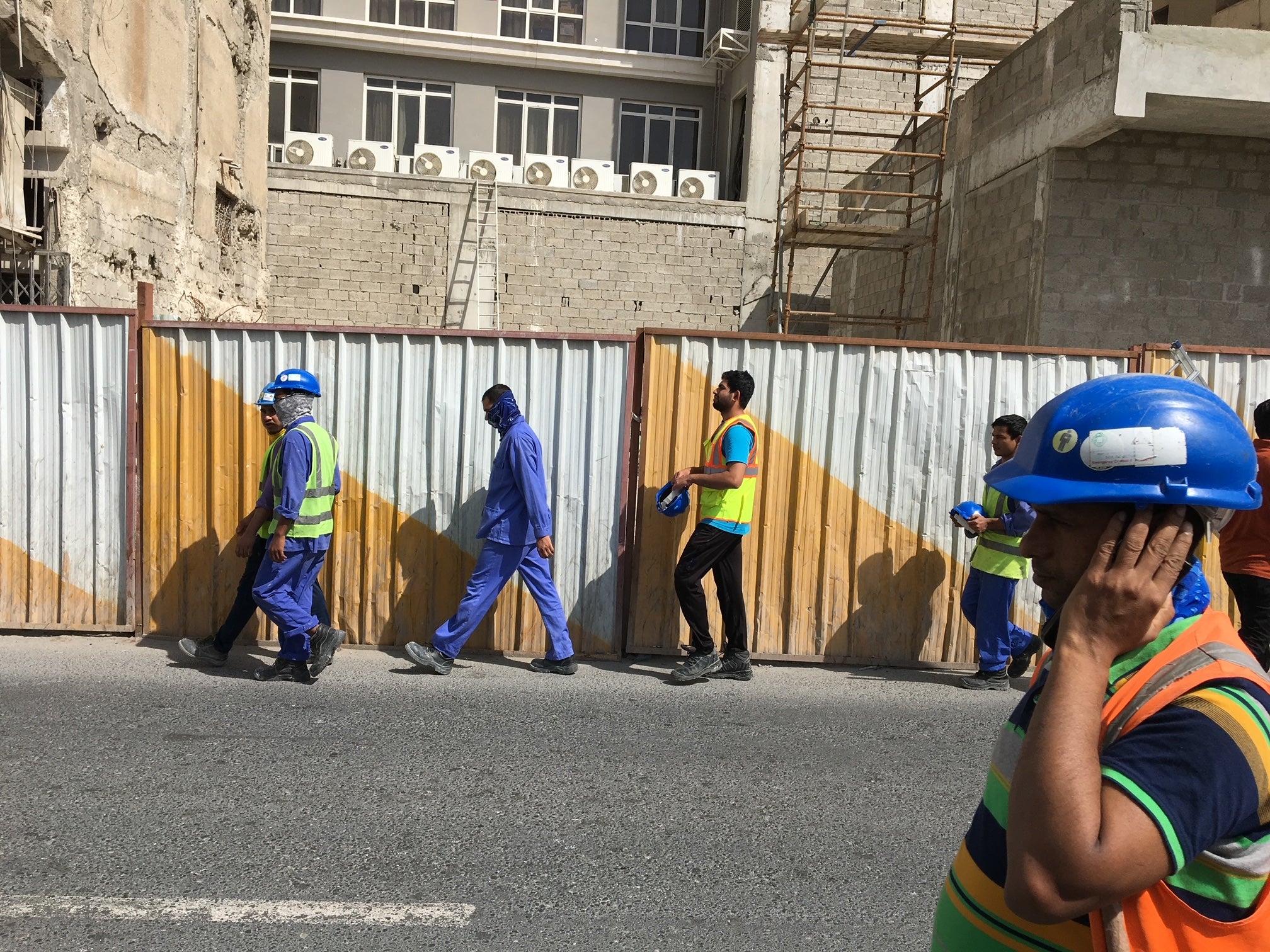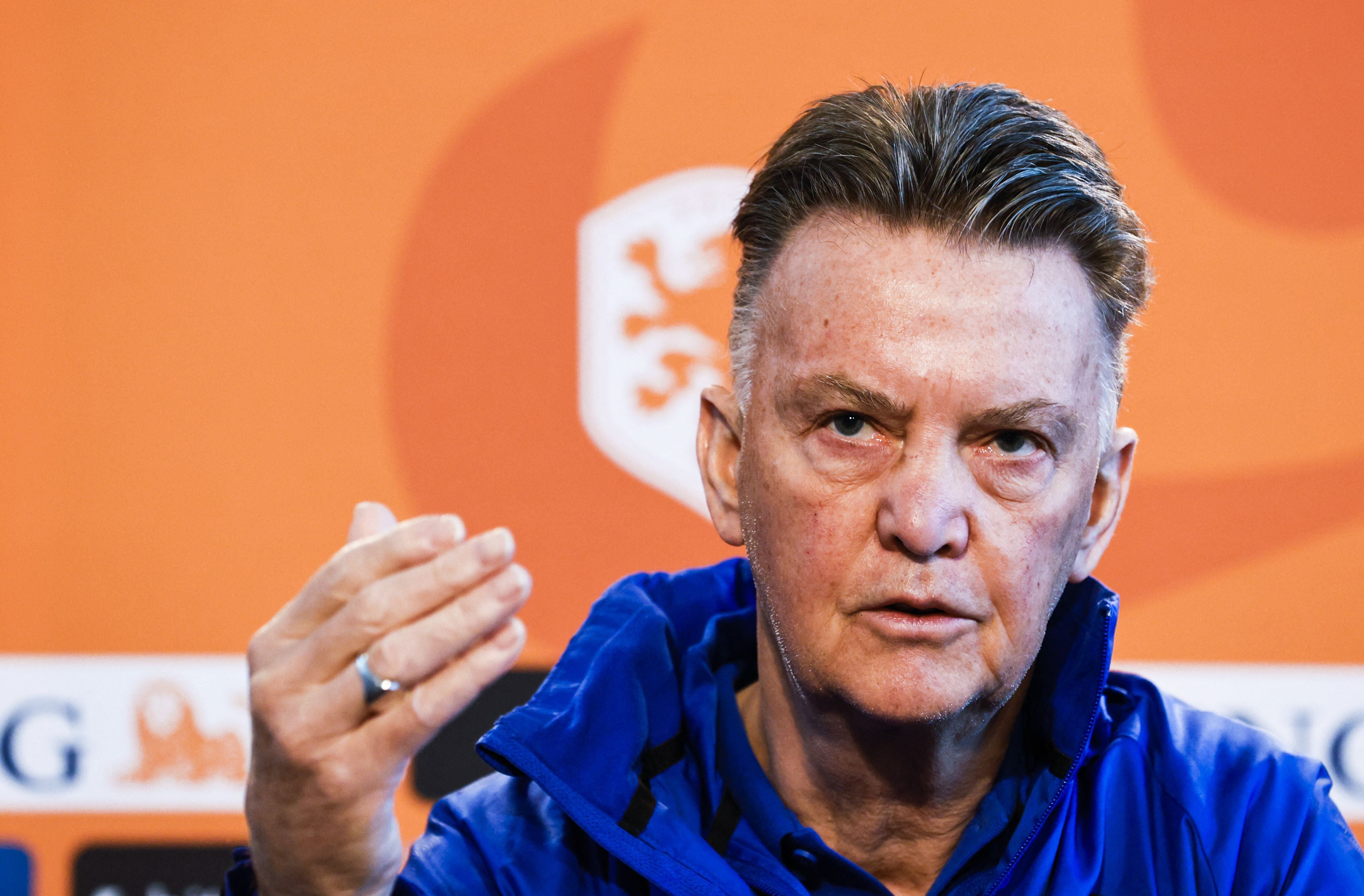The Dutch star who protested at the 1978 World Cup and why it is relevant for Qatar 2022
Wim Rijsbergen visited the Mothers of the Disappeared in 1978, and his political trip could be a foretaste of what happens at the Qatar World Cup later this year, writes David Harding


If World Cups were won on candour, then Netherlands head coach Louis van Gaal would have finally secured football’s top prize for his nation.
Asked if Qatar should be hosting this year’s tournament – which kicks off in November – Van Gaal decided he was not one for platitudes.
“It’s ridiculous that we are going to play in a country... how does Fifa say it? To develop the football there. That is bulls***. But it doesn’t matter – it’s about money, commercial interests. That’s the main motive of Fifa.”
The ferocity of his comments even drew a rare response from World Cup organisers in Doha, who claimed his remarks were “ridiculous”.
Qatar has been widely and regularly criticised in the run-up to the tournament for its human rights record, especially its treatment of workers from South Asia. A huge army of migrant labourers has helped transform the country in readiness for the first World Cup in the Middle East, in many cases at great personal cost.
Van Gaal, 70, has taken a personal role in the Dutch approach to evaluating the human rights situation in Qatar. He is part of a committee within the national football association (KNVB) which meets every month to do just that.

“Louis van Gaal is very socially aware,” says seasoned Dutch journalist and television presenter Frits Barend. “The coach, players, national federation are right to give their voice about Qatar.”
The KNVB has spoken out against conditions in Qatar and even instructed its players to wear T-shirts protesting over the lack of human rights in the Gulf state last year ahead of World Cup qualifying games. The Netherlands have now qualified the tournament.
But Dutch World Cup protests are not a new phenomenon.
In 1978, the “Oranje” were, like now, one of the leading teams in the world. And, like now, they found themselves playing the World Cup in a country with a dubious human rights record, which faced calls for a boycott.
The World Cup 44 years ago was held in Argentina, then ruled by a military junta under General Jorge Rafael Videla. The general, complete with bushy moustache beloved by dictators and dubbed the “Hitler of the Pampa”, looked almost comical, but there was nothing remotely amusing about him.
He headed a vile and brutal regime which embarked upon a bloody period of state terror known as the “Dirty War” in the run-up to the tournament.
During this period, up to 30,000 people – many who were left-wing opponents of the generals – were killed or disappeared over several years. Torture was widespread as were extra-judicial killings. Some of the torture was carried out at a prison not far from the Estadio Monumental, where Argentina would end up beating Holland 3-1 after extra time in the World Cup final.
It is estimated that as many as 4,000 victims of the regime died after being drugged, loaded onto planes, and thrown from the aircraft into the River Plate below, a perverse hallmark of a regime which relished killing. Moreover, newborn babies were routinely taken from mothers who were being held at regime detention centres and handed for adoption to families who backed the junta.
Most organisations might blanch at holding a tournament in such a country, but Fifa has long been immune to such sensibilities. Its president João Havelange praised the host nation for its “hard work” and took “pride” in the tournament’s location. One of the tournament’s guests was Henry Kissinger.

“The World Cup was to show the world what a great country Videla’s Argentina was,” says Barend.
Calls for a World Cup boycott begun in 1977 and just as now were concentrated in Europe. France led the way, where protestors compared Videla to Hitler, but the campaign stretched as far as the Netherlands and pressure was put on the players to respond.
In Holland, in typically 1970s fashion, a campaign was led by a cabaret performer, Freek de Jonge, and a singer, Bram Vermeulen and their “Blood on the Pole” campaign.
The national squad discussed not going to the tournament but, anxious to avenge their heartbreaking defeat in the 1974 final against West Germany, decided to play. Fate was to decree that more heartbreak awaited the Dutch at the hands of tournament hosts. But what also transpired was something which showed the team were gamechangers on and off the pitch.
Wim Rijsbergen was an integral part of that iconic side of the 1970s. It was the “Brilliant Orange” team of Total Football, of the two Johans, Cruyff and Neeskens, one which revolutionised the sport, spawned legions of admirers and almost as many books.
Rijsbergen, a defender, played every game at the 1974 finals. In 1978 he got injured in the group game against Scotland.
That game is famous in Britain for Archie Gemmill’s wonder goal, immortalised on the big screen in Trainspotting. But the story of what happened to Rijsbergen because of that match is far less well known.
The Dutch team doctors were desperate for the defender to return to the starting line-up, and as the team located to the capital Buenos Aires for the final, they told Rijsbergen to ride a bike in an effort to regain fitness.

He took their advice but this was to be no ordinary bike ride. It was one which was astonishing at the time and something which, in the year of the Qatar World Cup finals, feels profoundly relevant.
Rijsbergen chose to ride to a site in town which had become a symbol of the resistance against Videla’s dictatorship – the Plaza de Mayo – to meet the Mothers of the Disappeared. There, every Thursday, women wearing white headscarves and whose children had been vanished – for which read imprisoned, tortured and killed by the regime – would march demanding to know what had happened to their offspring.
The protests, illegal under Argentine laws, took place outside the Casa Rosada presidential palace and became a notable act of defiance. The women gained global fame for their brave protests.
It is not the kind of place you might expect to see a footballer during a World Cup, but Rijsbergen had a horizon beyond the pitch and was determined to see the protests for himself.
“Of course it was a protest against the junta at the time,” he tells The Independent.
“I went with my friend [fellow injured squad member Wim Suurbier] because I was writing a column for a magazine. I was writing about the World Cup and the regime.
“Our physios said we had to ride a bike and I thought, ‘oh, that’s good, because I can ride to Plaza de Mayo’. At the time people were saying we should not go and that sports and politics should not mix. It is the same situation we see in Qatar.”
In the days before social media and wall-to-wall coverage of football around the globe, Rijsbergen was able to visit the Plaza de Mayo unrecognised and ended up watching the women protesters a “couple of times”.
“I was one of the players who was talking with other people in Holland,” Rijsbergen, now 70, tells The Independent from his home in Leiden. “They didn’t want us to go and we went to some of the meetings about playing in Argentina.”
“Of course, we discussed it in Holland before we went. I was always interested in politics. At the time I was 26, I was one of the players who was reading articles.”
It is no surprise that pressure was applied on the Dutch. Not only were they a leading team, their style of football suggested a team of deep thinkers, of players who refused to accept the norms and challenge conventions.
The parallels with Qatar are striking and this year’s tournament is set to be the most “political” since the 1978 tournament. Similarly there has also been a boycott campaign in the Netherlands.
“I think almost everyone who is even remotely interested in the Netherlands is against the World Cup in Qatar,” says Hein Meurs, founder of the “Cancel Qatar 2022” committee.
Just like 1978 though it has not succeeded.
“It is another matter whether people are prepared to follow this opinion in a practical way. That has turned out to be disappointing,” adds Meurs . “There are always uproarious protests when it becomes topical, for example around qualifying matches or remarkable news or statements from, for example, [Fifa president Gianni] Infantino or our national coach, but it always ebbs away.”
The Dutch will be there but although calls for a boycott have been defeated, player protest seems inevitable.

The precedent set by players taking a knee to highlight opposition to racism in recent years is likely to morph into gestures in support of Gulf workers, and the LGBT+ community in Qatar, where homosexuality is banned.
As well as the Netherlands, nations including Norway, Germany and Denmark have protested about workers’ conditions. England manager Gareth Southgate said there were “obviously ongoing concerns” about human rights in Qatar.
The Dutch team, like the English, are expected to undertake “symbolic trips” to labour camps in the fashion of the groundbreaking visit made by Rijsbergen.
“It is likely the 2022 World Cup could be something of a watershed moment,” says Professor Simon Chadwick, a director of the Centre for the Eurasian Sport.
“The Qatari organisers, keen to demonstrate how the country has changed, will be eager to foster a spirit of openness, albeit in a way that enables them to retain control,” he says.
“At the same time, player activists appear increasingly compelled and empowered to question and scrutinise what they disapprove of.”
Similar to Qatar, Videla used the World Cup to enhance Argentina’s reputation abroad and at home. The general knew that winning the tournament would deflect from domestic issues and undermine opposition to his rule.
And although he didn’t like football, he was savvy enough to be there – thumbs up – as the cup was handed over to Argentina’s victorious captain Daniel Passarella.
Legend has it that officers took out some prisoners out from their cells the night Argentina won the World Cup to show the nation’s euphoria and their political captives that they had no chance of galvanising any opposition to the junta. They then threw them them back into jail.
Dutch protests continued after the 1978 final. Invited to a banquet for both teams after the match, the players refused.
“They felt they had been part of the ‘Videla show’ and they wanted to show they would not be guests at his party,” adds Barend.
Rijsbergen says simply: “We wanted to say this was not a way to organise the World Cup.”
Videla himself was to end up dying in prison and the Mothers of the Disappeared still gather to protest today.
Rijsbergen says he has no regrets about going to Argentina, and has called on the Dutch FA to help players heading to Qatar.
He did not recover from injury in 1978 and never played for the Oranje again. Instead, he spent four successful years with the New York Cosmos – playing alongside Pele and Franz Beckenbauer – before embarking on a long managerial career.
But his mark on the history of the World Cup is indelible. Not only because he played for one the competition’s most storied teams, but also because of a groundbreaking bike ride.






Join our commenting forum
Join thought-provoking conversations, follow other Independent readers and see their replies
Comments